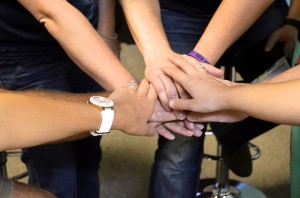
Contributor: written by Vantage Point of Northwest Arkansas clinical content team member Hugh C. McBride.
 For both clients/patients and family members, support groups can play an indispensable role during and after the residential phase of treatment. During treatment, addiction group leadership can help clients address issues that may have led to or been impacted by their primary diagnosis.
For both clients/patients and family members, support groups can play an indispensable role during and after the residential phase of treatment. During treatment, addiction group leadership can help clients address issues that may have led to or been impacted by their primary diagnosis.
After treatment, support group participation can have a significant effect on a person’s ability to achieve long-term recovery. For family members, support groups can eliminate their sense of isolation, prepare them to provide support to their loved one, and provide a forum for ensuring they are practicing appropriate self-care.
Strength and Value of Addiction Group Leadership
The strength of the support group concept is drawn from the ability of each participant to both receive help and make active positive contributions to the overall effort. And while equality is a hallmark of the support group structure, the presence of an effective leader or facilitator can greatly enhance the value that members receive from the experience.
In some addiction support groups, the leader is a professional, such as a therapist, counselor, or other expert. During treatment, this is almost always the case, as the groups are designed more as therapeutic activities than as support sources. In a non-treatment environment, the leader or facilitator may or may not have professional credentials.
In many cases, he or she is dealing with or has dealt with the same issues as the support group members. Prime examples of this arrangement are Alcoholics Anonymous (AA) and Narcotics Anonymous (NA), which are structured as “addicts helping addicts,” and which require that all members be dealing with the disease of addiction.
Understanding the Framework of Support Groups
Whether or not the addiction support group leader has professional training, there are certain qualities and skills that can significantly improve the quality and effectiveness of the group.
 According to information provided by the Center for Substance Abuse Treatment (CSAT) and the Substance Abuse and Mental Health Services Administration (SAMHSA), professional group leaders should be knowledgeable in group dynamics, should possess an appropriate theoretical framework such as cognitive behavioral therapy, and should have experience as a support group participant.
According to information provided by the Center for Substance Abuse Treatment (CSAT) and the Substance Abuse and Mental Health Services Administration (SAMHSA), professional group leaders should be knowledgeable in group dynamics, should possess an appropriate theoretical framework such as cognitive behavioral therapy, and should have experience as a support group participant.
The goals of a professional facilitator of a support group should be to encourage discussion, help members to share their experiences, guide participants through the process of solving problems, provide positive reinforcement, and model appropriate behaviors. Leadership of support groups, CSAT and SAMHSA report, is a matter of fostering positive interactions, respecting individual boundaries, and remaining “active but not directive.”
Peer-to-Peer
In a peer-operated support group, such as AA, NA, Overeater’s Anonymous, and several other groups, it can be beneficial for the person who serves as the meeting’s leader to have many of the attributes described in the previous section – especially the ability to encourage productive discussion, maintain respect for participants and their boundaries, and keep the group on-topic.
However, peer support group leaders do not have to possess expertise in CBT or any other therapeutic frameworks, nor do they need to have completed any formal training. However, many groups may offer some instruction for members who express an interest in leading meetings.
Key Characteristics of an Effective Addiction Group Leadership
Research has identified the following as the key characteristics that an effective support group leader or facilitator should possess:
- Are knowledgeable of group behaviors/leadership
- Possess a basic commitment to the self-help process
- Are capable of distinguishing/controlling personal views
- Are willing to work toward the group’s goals
- Have the ability to initiate activity
- Are comfortable with the expression of emotion, tension and conflict
- Are committed to the welfare of the group and all its members
- Value and respect each member as an individual
- Emphasize the positive aspects of the support group
- Encourage members to identify/evaluate alternatives for themselves
 With the exception of the first characteristic, this list focuses not on “book knowledge,” but on altruism, empathy, and strong interpersonal skills.
With the exception of the first characteristic, this list focuses not on “book knowledge,” but on altruism, empathy, and strong interpersonal skills.
Leading a support group is not about being able to disseminate knowledge or maintain control, though there may be times when such skills can come in handy.
Instead, leading a peer support group for addiction recovery or a related issue is a matter of understanding the issue, valuing the presence and contributions of all participants, and appreciating the many benefits than can result from the process.
Family Support Groups
For an addiction recovery support group, facilitators should be in recovery themselves. For family support groups, the facilitator should be a family member of someone in recovery. Sharing the experiences that brought others to the group can help establish credibility, strengthen relationships, and contribute to development of a truly effective peer support group.
Many treatment centers offer support groups as a part of their care so that clients/patients can reap the many benefits while receiving more intensive forms of treatment.
Among the many benefits of completing treatment that includes support groups is that clients/patients and family members will develop an understanding of the issues and experiences that will allow them to be productive support group participants, and which may contribute to their becoming effective support group leaders or facilitators as well.
About the Author:
“Effective Addiction Group Leadership Techniques” was /written by Vantage Point of Northwest Arkansas clinical content team member Hugh C. McBride. Hugh has several years of experience researching and writing on a wide range of topics related to behavioral healthcare. He has a Bachelor of Arts degree from Grove City College.
About Vantage Point of Northwest Arkansas:
Vantage Point of Northwest Arkansas is a comprehensive residential treatment program for children, adolescents, adults, and seniors who are struggling with mental health disorders and substance abuse/addiction.
The children and adolescent program is designed for clients ages 5 to 17, the adult program cares for clients ages 18 to 54, and the senior program is for ages 55 and above. The center accepts both male and female clients, and is designed to promote crisis resolution, positive self-awareness, social skills, and personal growth in an atmosphere of compassion and confidentiality.
The opinions and views of our guest contributors are shared to provide a broad perspective of addictions. These are not necessarily the views of Addiction Hope, but an effort to offer a discussion of various issues by different concerned individuals.
We at Addiction Hope understand that addictions result from multiple physical, emotional, environmental, and genetic factors. If you or a loved one are suffering from an addiction, please know that there is hope for you, and seek immediate professional help.
Published on April 11, 2015
Reviewed and Updated by Jacquelyn Ekern, MS, LPC on January 12, 2021
Published on AddictionHope.com
